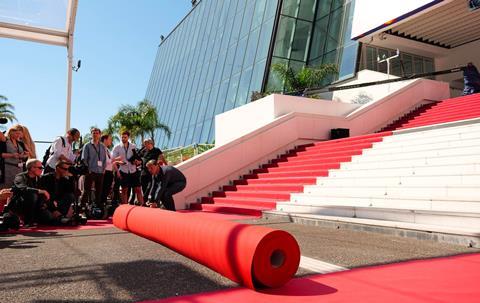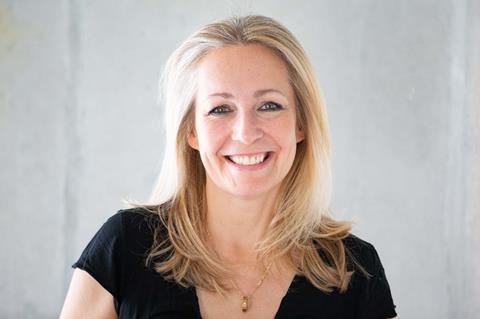
The UK’s film sales agents are heading into Cannes in a mood of steely determination, trying their best to not let US President Donald Trump’s threats of 100% tariffs on all films imported from “foreign lands” dampen their spirits. Largely because ,at time of writing, no one quite understands what it all could mean.
“I don’t have a clue, and I’m not sure if anyone has a clue, what it means,” says David Garrett, CEO of Mister Smith Entertainment. “Is he going to put tariffs on independent films? Will it be a tariff on the minimum guarantee? The budget? Whatever it is, it makes no sense.”
Garrett says he isn’t going to let Trump’s remarks influence how he does business at Cannes or how he engages with the US market. “I honestly think the best thing everyone can do is simply ignore it. It doesn’t make any sense. I frankly am not going to spend a nanosecond of my time trying to decipher what it means, when nothing makes sense.”
Others echo the “caution against panic” approach. For some, however, the back-of-the-mind threat is tough to put to one side. Many UK independent films depend on a US deal for financing, and on US production partners and US investment.
“It might never get into effect, but just the possibility of such a tariff will create unnecessary uncertainty towards the US market which was just starting to show positive signs of recovery after the strikes,” one UK sales agent told Screen earlier this week. “It could have the double deterring effect of affecting production finance of films that count on the US sale down the line as important collateral for financiers and making the import of foreign-language films prohibitive.”
This queasy uncertainty aside, several sales agents say they are heading to Cannes with their largest-ever slates.

“If it all comes together, we will have the biggest line-up in our company history,” says Gabrielle Stewart, CEO of HanWay Films.
Additions to the HanWay slate include Creep remake The Creep starring Jasmine Jobson and UK rapper Aitch, emotional thriller Photo Booth starring Lily James and Raffey Cassidy, and Werner Herzog’s Bucking Fastard headlined by Kate and Rooney Mara, alongside Orlando Bloom and Domhnall Gleeson.
Mister Smith is in a similar position. “Leaving aside the slate we had when we were working with DreamWorks [Mister Smith signed a mult-year output deal with DreamWorks in 2012], this could be our biggest and most commercial slate to date. I’m excited,” says Garrett.
He is selling shark serial killer thriller Dangerous Animals in Directors’ Fortnight. New to the slate is magical realist drama The Accompanist, starring Susan Sarandon and Aubrey Plaza, plus horror Hide And Don’t Speak from US production outfit Range, which made Longlegs.
Why the bumper slates?
“The market is recalibrating,” says Garrett. ’We all know and understand what the buyers are looking for are theatrical movies. However you interpret that, it means that films have a much better chance of being released in theatres, and that probably means bigger budgets, more obviously commercial. That doesn’t mean we are shying away from doing more elevated fare, but the elevated fare is very hard to pre-sell, it’s reliant on performances and wider acclaim at festivals.”
Cannes acclaim in 2024 proved particularly conducive for awards season and box office success.
“Anora, The Apprentice, Emilia Perez, Flow, The Girl With The Needle – all those films have landed Oscar nominations or awards and generated serious specialty box office across the world. There’s excitement for this Cannes, to see if we can replicate the commercial and awards success,” says Fabien Westerhoff, whose UK-France sales outfit Film Constellation will be attending its first market as Global Constellation.
It was acquired by pan-European Vuelta group, and merged with German sales outfit Global Screen just before Cannes. The companies are now fully intergraded, sharing an office at Cannes, and working across a single slate. Global Constellation has acquired Directors’ Fortnight title Lucky Lu.
As the independent film space becomes increasingly competitive, many sales agents anticipate further consolidation. “Without a doubt,” said one agent.
Who’s buying?

While Germany is looking healthy as a market to sell to, according to a number of sellers, many also expressed worries about the state of the pay-1 window (first exclusive release window following a film’s theatrical and home entertainment release) internationally, with particular concern around US, France and Spain.
“The biggest challenge at the moment is the risk profile we have to take,” says Ed Caffrey, head of acquisitions and business development at UK-Ireland distributor Vertigo Releasing.
“We’re a company without an output deal, so we have to sell SVoD title-to-title. At the moment, the way the economics are, we have to roll the dice on things we think are theatrical, and then hope we find a partner who sees that value as well. You have to get it right nine times out of 10, or the economics of the business get pretty challenging.”
Architect partner Calum Gray – who is launching the romantic comedy Getting Rid Of Matthew at Cannes – is intrigued by the move by some distributors to set up their own SVoD platforms in response to the pay-1 “blockade”. For example, Cineverse is controlling Screambox in the US, Icon Film Distribution has the Icon Channel in the UK and Australia’s Madman has a documentary streaming platform called DocPlay in the territory.
“That move is interesting,” says Gray. “I’d like to see where that goes in the market. The more you’re in control of your destiny across all the rights, the healthier your business can be.”
While Asia overeall has been tough post-pandemic, Taiwan, Indonesia and Vietnam are showing greenshoots, particularly for family entertainment and animation. Japan, however, remains tough for non-national independent titles.
“We are cautious, distributors are cautious,” says Maya Amsellem, founder and managing director of WestEnd Films, who continues sales on thrillers Traction, Breaking Cover and Uncle. “From what distributors say, a lot of projects get announced, and then do not get made. They’re cautious because it has to be a big film, or in the independent space, something that will get an Oscar or a big festival prize or something like that.”
“Ironically, the most buoyant territory is probably still in Russia,” noted one sales agent, “which will only remain buoyant for the independence as long as the studios aren’t putting their movies into Russia.”
For UK-Ireland buyers, precision is key. “It’s trying to find things that are very clear commercially. When you’re pre-buying, you’re taking a lot of completion risk,” explains Vertigo’s Caffrey.

“The theatrical landing pad has got smaller and smaller for independent films in recent years,” says Zak Brilliant, head of MetFilm Distribution. “We’re always thinking about the marketing, what the campaign will look and feel like, what the critical response will be. We’re thinking about that at point of negotiation.”
Such prudence takes time, with the pressure to close deals during the market generally limited to festival films.
“People have become much more judicious about the decisions they make, and by proxy, take longer to make them,” says Brilliant.
Genre hunt
Horror is still dominating the market, with a peppering of smart comedies, such as Simon Bird’s Pretend I’m Not Here starring Matthew Broderick, Sally Hawkins and Martin Freeman for Cornerstone.
It is about a couple who offer refuge to a Jewish perfume salesman during the Nazi occupation of the Netherlands.
“Right now, films that have something to say politically, even in a subtle way, are interesting,” says Mark Gooder, co-president of Cornerstone. “If they can find a way of providing a form of entertainment in that approach, that’s also a good thing. The market around the world is looking for comfort. Humour, mixed with something to say, mixed with a cast you like, goes a long way.”
Straight-up comedy, however, continues to be difficult to come by. “Comedy is cultural, and to cast them well, it’s hard in the indie space,” notes HanWay’s Stewart. “A-list talent tend to want to do independent film to win awards. For some reason, comedy hardly gets awards traction, which is completely wrong. I’m desperately looking for things that can travel, and are broad enough, for people to solve the modern romantic comedy conundrum. It’s harder in today’s world to get the romantic comedy formula right.”
Stewart would also like to see more quality thrillers in the market. “I do think there’s an audience looking for good thrillers because they are entertaining.”
Architect’s Gray senses immense potential for the independent film business to lean into the Gen Z market. “Gen Z and younger millennials are highly experiential. That experiential-ness is a real boon. There’s a return to the physical with them. I’m delighted to see an infrastructure is coming up around them, like [online social platform] Letterboxd, that has over 17 million unique members, that replicates that feeling of community and word-of-mouth we always used to have from the theatrical experience. I can see all these positive developments in that audience.”















![[L-R]: Amanda Villavieja, Laia Casanovas, Yasmina Praderas](https://d1nslcd7m2225b.cloudfront.net/Pictures/274x183/6/4/1/1471641_pxl_20251224_103354743_618426_crop.jpg)









No comments yet